The Potential of HubSpot for B2B Firms | An Ultimate Guide
A complete guide to understanding compatibility, use cases, and limitations of HubSpot for B2B.

The ultimate guide to HubSpot for SaaS success, understanding compatibility and use cases for unlocking growth and efficiency.
Businesses nowadays are constantly looking for tools and platforms that can help them drive growth and scale their operations. This challenge is even more acute for Software as a Service (SaaS) companies, given the unique demands of their subscription-based business models.
HubSpot, a tool widely known in the SAAS community, provides an integrated suite of tools that streamline marketing, sales, and service processes, enabling businesses to attract, engage, and delight customers consistently.
This guide will explore the compatibility and various applications of HubSpot within the SaaS realm, helping companies unlock their full potential through optimized use cases and innovative approaches.
To determine if HubSpot is a good fit for your SaaS business, it's important to compare the features it offers with the needs of typical Marketing, Sales, CRM, and Service functions that keep a SaaS business running smoothly and effectively.
In the following sections, we'll list the features essential for a SaaS business and see how HubSpot stacks up in providing them. By using this comparison, you'll be in a better position to assess whether or not HubSpot will be a good fit for your SaaS business.
| Features SaaS Needs | Availability in HubSpot |
| Renewal and Churn Prediction | ❌ |
| Integration with the Billing System | ✔️ |
| Automation | ✔️ |
| User-based access control | ✔️ |
| In-App Messaging and Communication | ❌ |
| Usage Analytics and Tracking | ❌ |
| Customer Segmentation for Targeted Upsells | ✔️ |
| Customer Health Scoring | ✔️ |
| Product Analytics Tools | ❌ |
| Customer Training and Education Tracking | ❌ |
| Marketing Automation | ✔️ |
| Integration with Social Media Platforms | ✔️ |
| GDPR Compliance | ✔️ |
| Lead Generation and Conversion Tracking | ✔️ |
| Lead qualification and scoring | ✔️ |
| Account and Subscription Management | ✔️ |
| Trial and Onboarding Tracking | ✔️ |
| Affiliate and Partner Tracking | ✔️ |
| Business card scanner | ✔️ |
| Sales pipeline | ✔️ |
| Queues for lead distribution | ✔️ |
| Lead escalation | ✔️ |
| Activity feed | ✔️ |
| Email templates | ✔️ |
| Calendar management | ✔️ |
| Personal notes | ✔️ |
| Scheduled reminders | ✔️ |
| Chatbots | ✔️ |
| Customer Feedback Collection | ✔️ |
| Customer Support Ticket Integration | ✔️ |
| Feature Request Management | ❌ |
| Service level management | ✔️ |
| Self-service portals | ✔️ |
| Customer sentiment analysis and CSAT scoring | ✔️ |
HubSpot exhibits notable compatibility with the SaaS industry, offering diverse features. For example, HubSpot offers lead scoring for SaaS ensuring a personalized strategy in identifying and prioritizing potential customers based on their engagement and compatibility with your software solution. Nevertheless, it's important to acknowledge that specific feature gaps may surface during initial implementation or as you scale your operations.
To unlock HubSpot's full potential for your SaaS venture, you must define clear goals and objectives for the specific utilities you aim to extract from the platform. In the event of encountering a feature gap, seeking the expertise of a HubSpot Consultant becomes crucial. Their insights can assist in assessing the practicality of workarounds or alternative solutions. Adopting this proactive approach ensures your SaaS operations' sustained smoothness and success.
The software as a Service (SaaS) model has revolutionized how businesses operate, with tools and solutions designed to cater to almost every business function. HubSpot, an all-in-one growth platform, stands out due to its comprehensive suite of hubs that cater to various business processes.
HubSpot's Marketing Hub is an all-in-one solution that streamlines campaign creation, lead generation, lead nurturing, and analytics for effective digital marketing strategies. Common use cases are:
HubSpot Blogging tool simplifies content creation and facilitates lead generation with its user-friendly Drag and Drop Editor, eliminating the need for coding expertise.
As a SaaS business owner, you can leverage the HubSpot blogging tool to consistently publish insightful content. By strategically placing lead capture forms within your posts and offering valuable resources in return for contact details, you can regularly generate leads. This approach not only establishes your authority but also funnels qualified prospects into your sales pipeline.
HubSpot's Content Management System allows businesses to create optimized landing pages for conversion, ensuring that the page is not just a digital brochure but a lead generation machine.
For example, a SaaS business can make use of HubSpot's landing pages to generate excitement for an upcoming product launch. By designing a special landing page that showcases an appealing offer, such as an exclusive early access trial, they can collect important visitor details through a straightforward form. This smart strategy might help them create a list of highly interested potential customers, greatly boosting their lead generation efforts for the imminent product release.
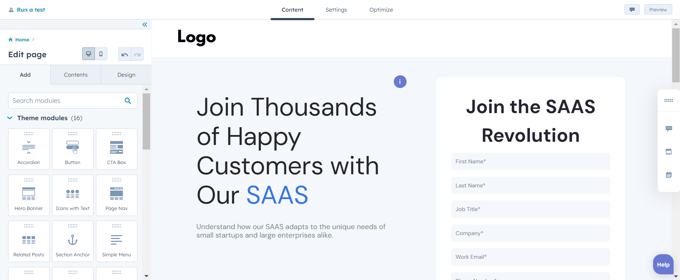
Call-to-actions (CTAs) are essential for directing website visitors to take desired actions, like signing up for a demo. With HubSpot, you can design CTAs that resonate with your audience and align with your brand.
For example, you can employ HubSpot's CTAs to enhance lead generation. You can create an engaging CTA urging website visitors to access a comprehensive industry best practices e-book. By strategically placing this CTA within high-traffic blog posts and monitoring user engagement, you can effectively capture leads interested in their offerings and expertise.
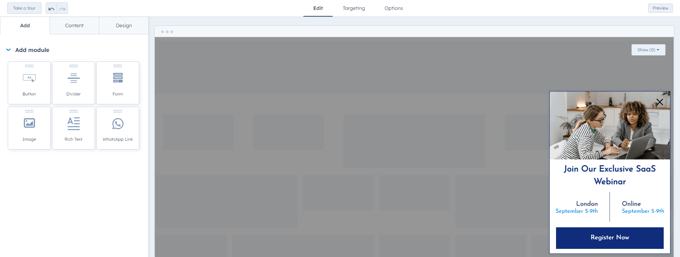
Just like HubSpot's Blogging tool, HubSpot's custom forms can be easily created with a drag-and-drop editor. These forms are instrumental in converting anonymous website visitors into qualified leads.
For instance, you can design a dedicated sign-up form for a free trial of their software and place it on the homepage. As website visitors fill out the form, their information is automatically captured, enabling the business to follow up with personalized email sequences. This approach efficiently turns website traffic into valuable leads and potential customers.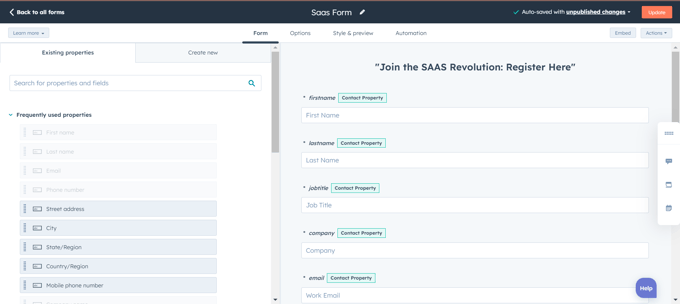
Once you have generated leads, you must nurture them to keep your brand top-of-the-mind. HubSpot's email marketing automation tools enable SaaS companies to send targeted content quickly to move leads down the funnel.
Moreover, for many SaaS businesses, offering trials is a common tactic. HubSpot helps automate follow-ups during the trial phase, ensuring that the right customers receive timely assistance, reminders, and incentives to convert into paying users. Understanding the nuances of HubSpot Lifecycle Stages can further refine your approach to lead management.
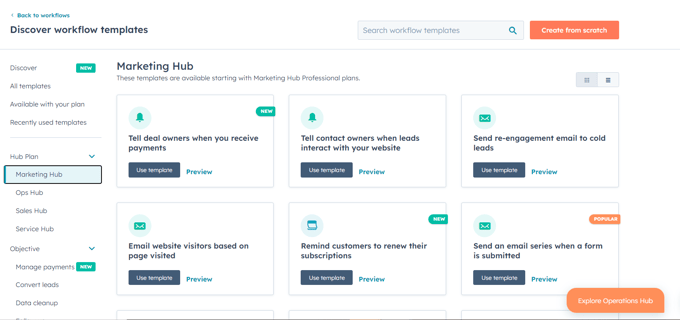
HubSpot Sales Hub is one of HubSpot's core offerings, designed to help businesses with their sales processes, including tracking, automation, and communication. The Sales Hub can be particularly valuable for SaaS companies, given these businesses' unique sales challenges.
These common functionalities of HubSpot Sales Hub can be invaluable for any SaaS business:
HubSpot provides numerous CRM features such as a sales pipeline that helps manage and monitor all your leads and customers. This ensures that your sales team has a 360-degree view of the customer, aiding in personalized outreach.
HubSpot Email Sequences are a set of tools that allow you to automate much of your sales process by automating messages to your prospects, saving you time in your sales outreach.
In a practical scenario, a SaaS business may employ HubSpot Email Sequences to streamline its sales outreach. After identifying a list of warm leads, they can initiate a sequence of automated follow-up emails tailored to potential customers' needs and interests. This approach saves time, ensures consistent communication, and increases the chances of converting leads into paying customers.
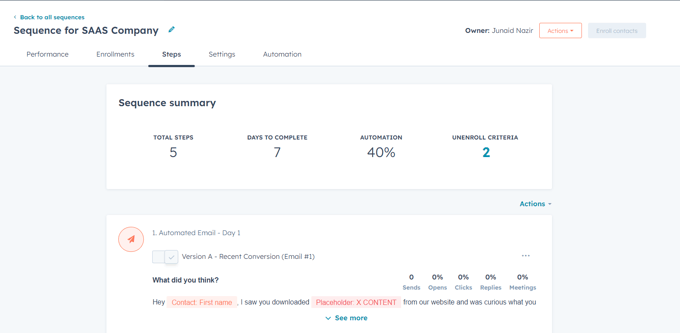
The playbook tool empowers you to craft interactive content cards that can be viewed within contact, company, deal, and ticket records. When engaging with prospects and customers, your team can utilize these cards as quick references, facilitating consistent and standardized note-taking for more effective conversations.
For instance, a SaaS business's sales team can employ Playbooks during a call with a prospective client. These interactive content cards serve as valuable references, ensuring the sales team is well-prepared to address the prospect's specific needs and questions, potentially increasing the likelihood of a successful sales conversation.
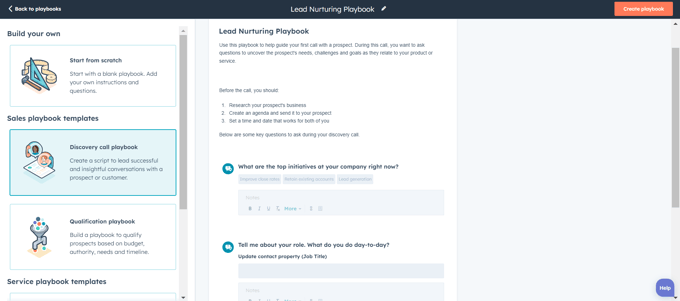
HubSpot's reporting for saas and forecasting tool provides valuable insights into your sales team's performance, helping identify both challenges and opportunities.
For SaaS businesses, tracking metrics such as Monthly Recurring Revenue (MRR) and Customer Acquisition Cost (CAC) is vital, and HubSpot Sales Hub is equipped to efficiently monitor and analyze these critical data points.
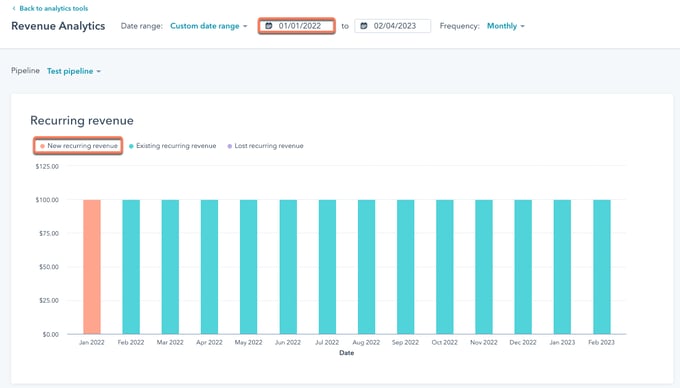
If you also use HubSpot's Marketing or Service hubs, integration between them can provide a holistic view of a lead or customer's journey, from the first touchpoint to the post-sale support.
By using HubSpot’s personalization tokens, you can customize content based on your contacts' CRM property values, enhancing engagement in your email campaigns and website interactions.
Using HubSpot's personalization tokens, a SaaS business can personalize email greetings with the recipient's first name and tailor the email content to reflect their product interests and interactions. This enhances engagement, significantly increasing the likelihood of the email being opened, read, and acted upon.
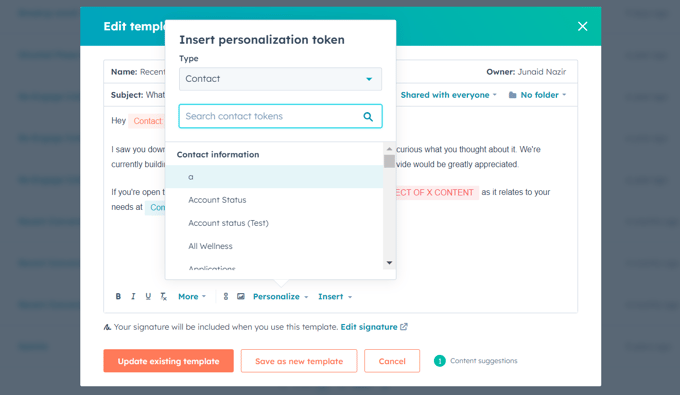
Streamlining onboarding communication is crucial to helping new users navigate your software effectively. Using the Sales Hub, you can deliver personalized content designed to educate them about specific software features, ensuring a smoother and more successful user experience.
Meeting scheduling simplifies the task of leads booking demo sessions or calls. Through an integrated calendar, it empowers them to schedule appointments without the usual back-and-forth communication, making the process efficient and hassle-free.
For example, a SaaS sales representative can streamline the scheduling of product demos using HubSpot's Meeting Scheduling tool. They send a personalized email with a scheduling link after a promising sales call, allowing the lead to select a suitable demo time. This process not only saves time but also enhances the prospect's experience, leading to more successful product demonstrations and improved conversion rates. Moreover, you can incorporate a professional touch to your emails with a well-crafted HubSpot Email Signature.
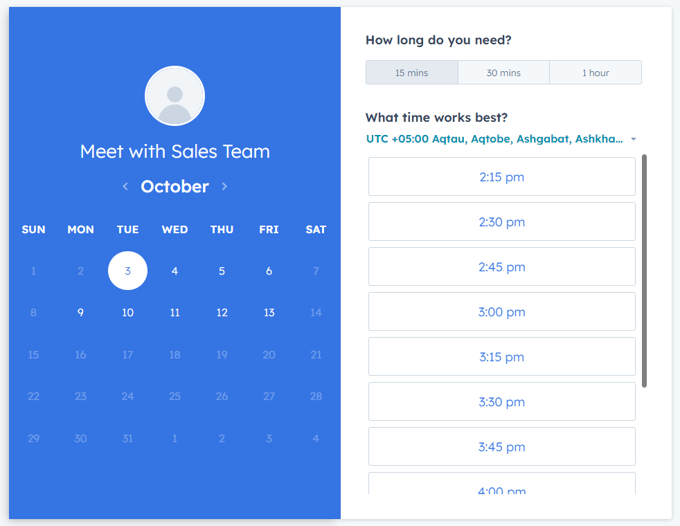
HubSpot's Live Chatbot empowers you to engage with website visitors effectively. These chatbots serve as valuable tools to initiate real-time conversations and connect with your online audience, ensuring timely responses to inquiries and providing immediate assistance.
For instance, if someone is exploring your pricing page, a chatbot can proactively answer their questions or help set up a demo.
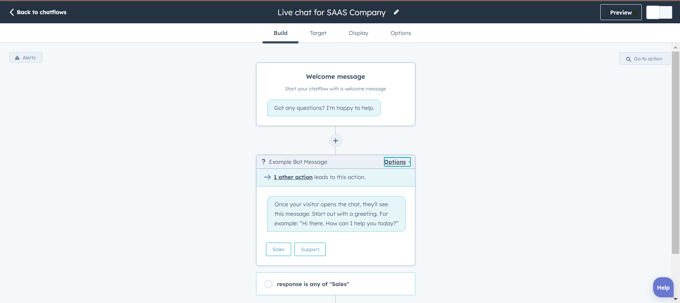
HubSpot Documents is a versatile tool that empowers teams to create a centralized content repository. It streamlines document sharing and collaboration, making it easier to engage with contacts and enhance productivity.
If you send out general marketing material or other documents to potential customers, you can see when they have been opened, how long they were viewed, and which sections got the most attention.

HubSpot's Service Hub offers a holistic customer support solution, enabling companies to provide top-notch service encounters. It offers mechanisms for handling tickets, gathering feedback, and curating a knowledge database.
Retaining existing customers is as crucial, if not more so, than acquiring new ones. HubSpot aids in tracking customer health scores, feedback, and queries. You can have timely intervention if a customer seems unhappy or unsatisfied.
These include ticketing systems, which help manage and resolve customer issues efficiently, and knowledge bases, which allow users to self-service common queries.
HubSpot's CMS Hub offers a user-friendly platform to effortlessly create, manage, and optimize website content for enhanced digital experiences. Common use cases are:
HubSpot SEO tools offer site optimization recommendations, assist in crafting a search authority-driven content strategy, and seamlessly integrate with HubSpot's content management tools for a comprehensive SEO.
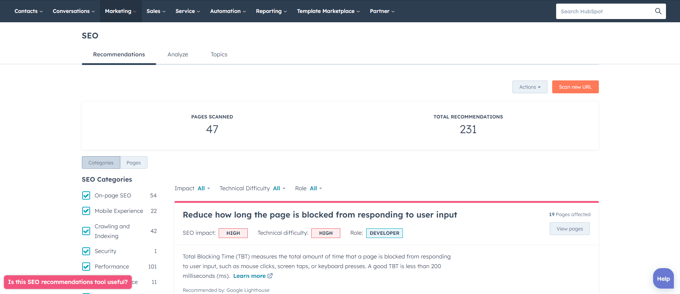
With HubSpot CMS personalization, you can craft customized experiences featuring personalized recommendations, dynamic content, and exclusive offers for your visitors. This dynamic feature adapts to visitors' behavior, demographics, and interests, delivering a more engaging and relevant interaction on your website.
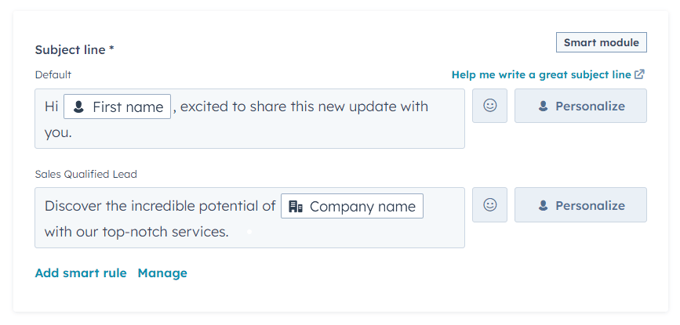
This feature allows you to create and compare two versions of a page on your website to see which one performs better. You can use this to test different elements of your HubSpot integration, such as forms, CTAs, chatbots, etc.
HubSpot's Operations Hub is designed to optimize and enhance business processes through integration, automation, and data management capabilities. The Operations Hub can be especially beneficial if you are a SaaS business.
Here is how the key features of the Operations Hub relate to SaaS needs:
With HubSpot's webhooks, you can send real-time notifications from HubSpot to other services when a specified event occurs.
In a SAAS, Integration of HubSpot with your own SAAS tool is important and sometimes instant data updates from HubSpot are needed in another tool. In these cases, the HubSpot Webhooks feature enables us to send webhooks within Workflow Actions.
Maintaining consistent data across platforms is crucial for SaaS businesses. Data discrepancies can lead to misinformed decisions and customer service mishaps. Data Sync or two-way integration tools for various platforms in HubSpot ensures consistent and updated data across platforms.
For SaaS businesses, metrics like Monthly Recurring Revenue (MRR), Churn, and Customer Acquisition Cost (CAC) are vital. HubSpot Operations Hub provides datasets to monitor these metrics, helping businesses stay on top of their performance but all of these metrics are not built-In features, and calculations and manipulation are needed to calculate some of these metrics.
While HubSpot is widely recognized as a game-changer for many organizations, SaaS (Software as a Service) companies often encounter specific challenges in HubSpot.
Here are some common issues they face:
For SaaS companies, metrics are the lifeblood of their business. KPIs (Key Performance Indicators) such as Monthly Recurring Revenue (MRR), Customer Acquisition Cost (CAC), Churn Rate, and Lifetime Value (LTV) are critical for these businesses to track their health and growth.
While HubSpot offers a list of marketing and sales metrics, and to some extent MRR as well, the unique needs of a SaaS model mean that these companies often have to seek third-party integrations or resort to manual methods to track their essential KPIs. This can lead to disjointed data and increased complexity in decision-making processes.
Product analytics is crucial for some SaaS businesses. It allows them to understand user behavior, product adoption, feature utilization, and much more. Insights derived from product analytics are essential for iterative product development, customer satisfaction, and churn reduction.
Given HubSpot's primary focus on marketing, sales, and service, it commonly lacks built-in product analytics.
SaaS companies, therefore, must rely on other specialized tools like Mixpanel or Amplitude to fill this gap. Integrating these external tools with HubSpot can be cumbersome and may lead to data silos where information isn't seamlessly shared across platforms.
Effective in-app communication capability is a must-have for some SaaS platforms. Whether it is for onboarding new users, offering feature tours, or delivering critical announcements, in-app messages can significantly enhance user experience and engagement.
Unfortunately, HubSpot does not natively support in-app communication automation. While it offers email, SMS, and Whatsapp communication tools, these differ from direct in-app prompts or guides. This lack can make it more challenging for SaaS companies to deliver real-time, context-specific communication to their users.
Referral programs can be a significant growth driver for SaaS companies. A happy customer referring the product to their peers lowers customer acquisition costs and brings in highly qualified leads that have a better chance of conversion.
However, managing these referral programs can be a challenge in HubSpot. The platform can track sources of leads and assign them to specific marketing campaigns, but it does not have a built-in mechanism to manage and reward referrals. This omission means SaaS companies must use additional tools or custom solutions.
HubSpot for SaaS has proved to be a valuable asset to numerous companies. However, businesses need to understand their capabilities and limitations realistically. By doing so, they can leverage HubSpot's strengths to their advantage and seek supplemental tools where needed which can lead to an efficient and effective management of their operations. Nonprofit organizations, too, can benefit from this approach by exploring the potential of HubSpot for Nonprofits to enhance their outreach and engagement strategies.

A complete guide to understanding compatibility, use cases, and limitations of HubSpot for B2B.

Discover how HubSpot for manufacturing firms can supercharge your ROI. Explore real-world examples and limitations for manufacturing firms using...

Explore the potential of HubSpot for B2C to increase sales and growth. Discover compatibility, features, and real-world use cases for informed...